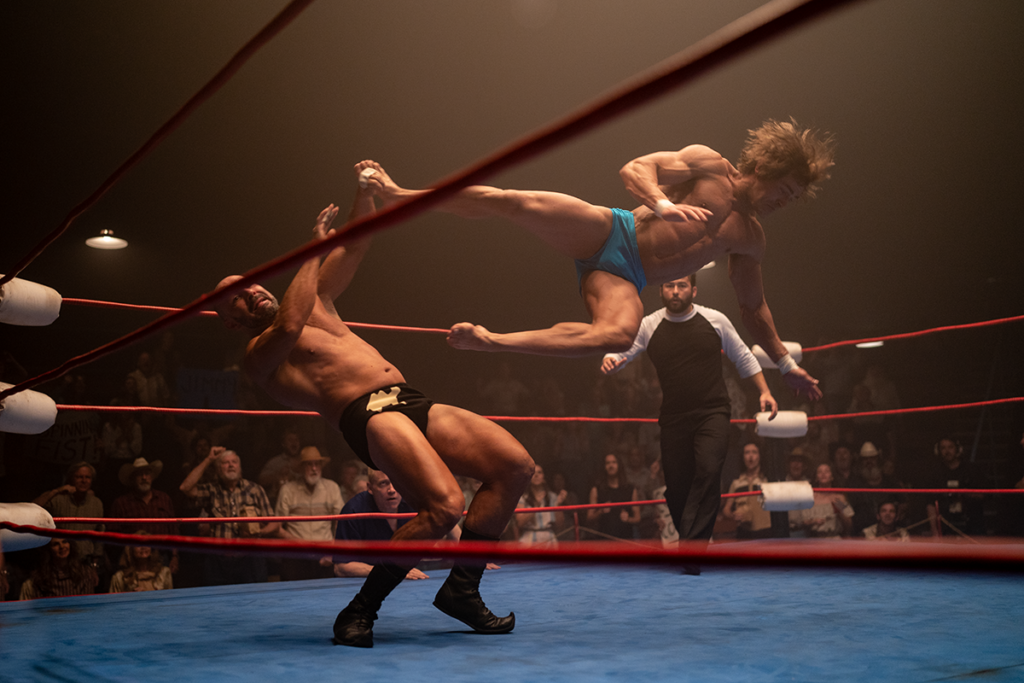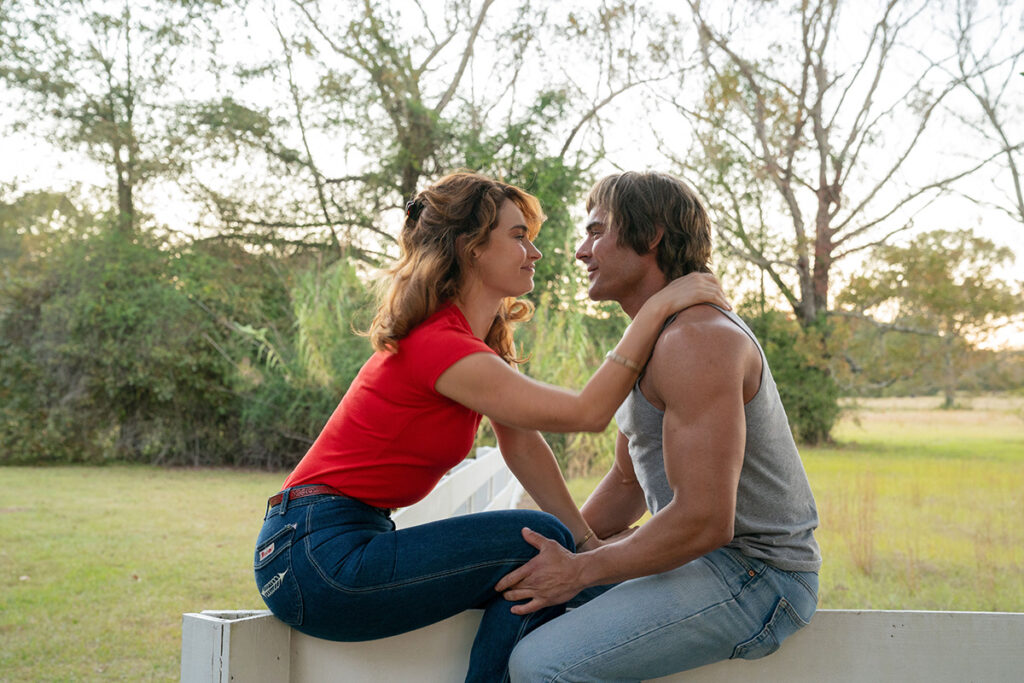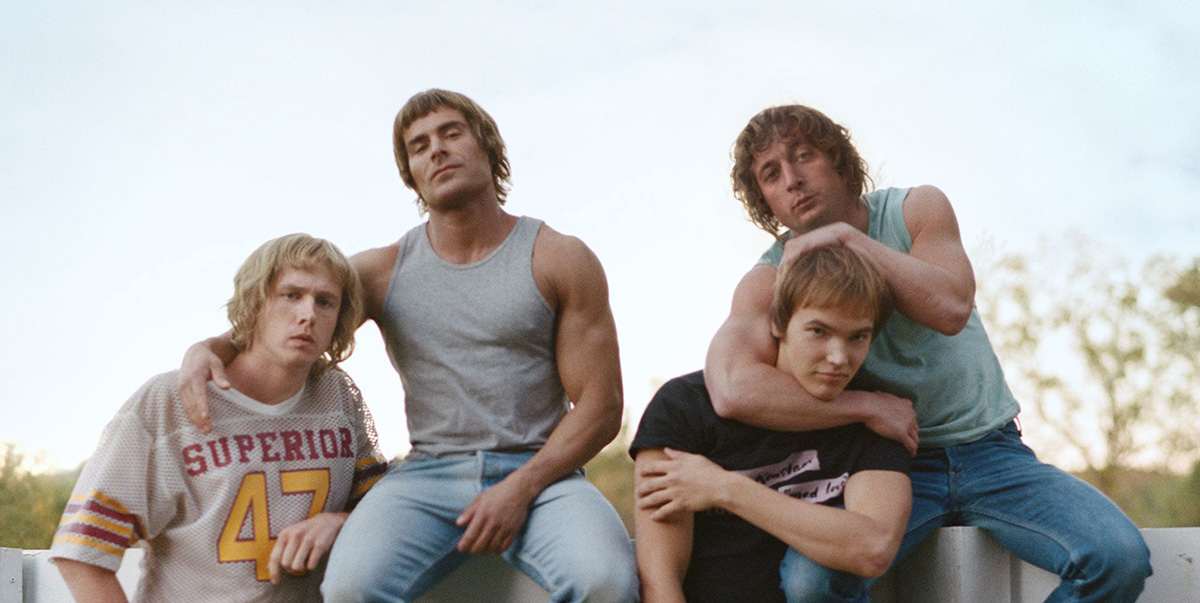When the violence of the world feels senseless, the mystical can help: labeling tragedy as curses or prophecies can help us find relief. Mysticism provides language to reason our way out of deeply unreasonable circumstances. And the mystical language of family curses makes director Sean Durkin’s The Iron Claw such a powerful film.
The Iron Claw is inspired by the tragedies plaguing the real-life Von Erich family, who dominated the world of professional wrestling in the 1980s and 1990s. It is a biopic that portrays the painful realities of generational trauma on sons, the weight of familial expectations, tenderness between brothers, and, above all else, the perils for young men who ascribe to the rigid molds placed upon them by the patriarchy.
Durkin introduces us to the Von Erich family by establishing the prominence of their family curse in their lives. Five years before the film begins, Fritz (Holt McCallany) and his wife Doris (Maura Tierney) lose their six-year-old son, Jack Jr., in a tragic accident.
The Iron Claw opens with a scene filled with Fritz’s paranoia. He unveils a brand-new Cadillac for the family, an expense that feels illogical when they’re still living in a dingy motorhome. Doris challenges his purchase and Fritz speaks about his fear of the curse, explaining away his behavior as the antidote to their troubles. “The only way to beat this thing that follows us,” he says, “is to be the strongest, the toughest, the most successful. The best.”
Here we first encounter the Von Erich curse, and, more importantly, see Fritz’s desperation to be rid of it. He proclaims his firmest belief – which will ultimately crush his family under the weight of its promise: once he becomes the embodiment of masculine strength, Fritz will finally free his family of their maladies, protecting his sons from the world’s haphazard violence.
This mystical response to tragedy empowers Fritz to move forward from grief without actually processing the loss of his child. And Kevin, the now-eldest son of the Von Erich clan, sits in the backseat of the Cadillac, listening intently to his father’s message, internalizing the idea that unflinching, inflexible strength is the only protection from the world’s harms.
The next scene features now-adult Kevin (Zac Efron). He looks like a new and improved version of his father at his prime – a massive, muscular man who sends fear into the hearts of all his opponents. The specter of his father’s mantra haunts his hulking physique.
The rest of the film interrogates the ethos that traditional masculinity can protect its strictest adherents from tragedy, tearing into it with each scene. By showcasing Kevin’s position in relation to each of the members of the family, Durkin allows us to understand how the family curse has shaped each of the Von Erichs. Kevin is the family’s dutiful eldest son and emotional center. Fritz is the well-meaning but intensely austere patriarch, while Doris enables his severity by habitually rejecting Kevin as he attempts to connect with her emotionally. Middle children David (Harris Dickinson) and Kerry (Jeremy Allen White) idolize Kevin, desperate to embody masculinity the way he does, while the youngest brother, Michael (Stanley Simons), chafes intensely under the weight of Fritz’s expectations.
As the Von Erichs embody the patriarchal ideal, all goes well for them. In moments where they succeed at performing their physicality, the brothers seem almost enveloped in protective armor, one that shields them from the violence of the curse.

Durkin portrays the brothers’ physicality with a brash masculine energy that is impossibly seductive in The Iron Claw. Watching the sheer physical power of Kevin, David, and Kerry in the ring, slamming down men twice their size with the violence of a jackhammer is as potent as a drug. The undeniable strength of the Von Erichs lulls the audience into believing the promises of Fritz’s mantra
But when they are at their physical best is when Durkin introduces the first chink in the Von Erich armor. She comes to us in the form of Pam (Lily James).
When we first meet her, Pam asks Kevin out on a date after one of his matches at the Sportatorium. The All-American, unflinchingly masculine Kevin crumbles under her request, revealing that he has never been on a date before. Here, Pam renders Kevin vulnerable, forcing him to confront his shortcomings.
It’s a pattern the pair repeat, thanks to Pam’s refusal to play the part of the demure woman as Doris does. Through Pam’s subversion of these standards, Kevin finds the space to break for the very first time, finally opening up to someone within his world.
Kevin’s interactions with Pam allow us to see someone in the Von Erich family experience a moment of reprieve from the inflexible austerity of Fritz’s all-consuming dictum. Kevin is finally allowed to acknowledge his fear of the curse, and instead of being belittled or ignored, Pam holds and supports him.
But moments of tenderness like these do not go unpunished – the Von Erichs are plagued by a series of losses that only increase their paranoia about the curse. They are a family operating under the severe constraints of patriarchy. Anything less than the utmost faithful adherence to masculinity’s demand means that they have failed.
Despite this, Pam becomes more and more entrenched in the lives of the Von Erichs, empowering each of the brothers to subvert the constraints of Fritz’s patriarchal rule.

Durkin and his editor, Matthew Hannam, are able to declare Kevin’s fate in a visually stunning sequence that changes the entire trajectory of The Iron Claw. After a match, Kevin, David, and Kerry are relaxing in the locker room of the Sportatorium. The grind of the match is palpable and the three men look physically exhausted. In the three-face dissolve, we see Kerry covered in blood; David in an inordinate amount of pain, injecting his lower back with something; Kevin, on top, strapping an ice bag to his knees, looking haunted by the day’s events. This editing choice serves as Kevin’s moment of truth: we now see that he is our tragic hero. He is the one who must disrupt the brutish, unrelenting violence of Fritz’s devotion to masculinity and change the fate of the family.
But everyone else in the family is still shackled by the confines of Fritz’s expectations. And it slowly but surely kills them all.
Almost like the lifting of a veil, Durkin’s storytelling makes it so that once the Von Erichs encounter a life beyond the constraints of masculine strength, they must pursue it or die by their stubborn attempts to fit the perilous mold of patriarchal achievement.
Kevin is left alone to release the weight of the legacy his father has handed him, and he does so to build a better life for his sons and his wife. In the film’s final scene, Kevin sits in his backyard, watching his two young sons play football like he used to with his brothers.
The mundanity of the act is triggering for Kevin, flooding him with grief. Within seconds, he’s sobbing and his sons rush to him, embracing him. It’s a show of vulnerability that allows him to relinquish the fictitious power that his toxic masculinity once guaranteed him. Here, he learns of the real power of allowing himself to feel the enormity of his losses.
This reality slowly dawns on him as he tells his sons that he’s sad because he “used to be a brother,” but now, after the death of all of his brothers, he’s not.
His eldest son tightens his grip on his father, feeling the immensity of his sorrow, and eagerly, as only a child would, tells him “We’ll be your brothers now.” This ability to be both sad and affirmed at once brings Kevin closer to his sons than he ever was with his brothers.
Durkin ends the film with a moment of complete tenderness for Kevin. It is here that Kevin finally breaks the Von Erich family curse, freeing his sons from a life characterized by violence, coldness, and shame. This language of mysticism allows him to realize a difficult truth, one that his father turned away from: there is no way to circumvent the pain of loss, regardless of the illusory promises of patriarchal protection that capture the imaginations of so many men. With The Iron Claw, Durkin warns us all of a haunting reality: the farther we run from loss, the closer it comes.

